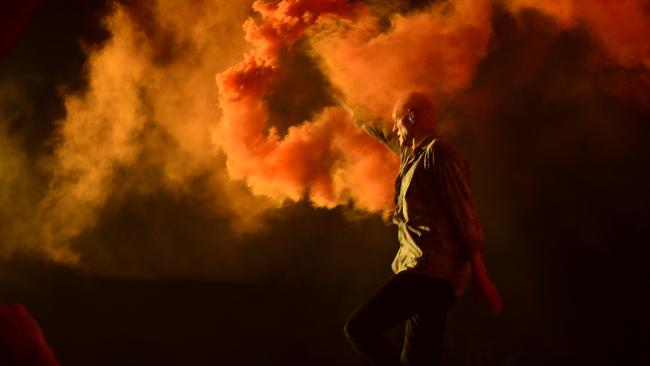Oils burn long past midnight
With its Great Circle tour, Midnight Oil ditched the greatest-hits format for a more ambitious approach.

In November last year, one of the most remarkable tours in Australian music came to an end. After 77 shows in 16 countries that were attended by about 500,000 people, Midnight Oil played its final concert of the year in the centre of Sydney, surrounded by the parklands of the Domain and the skyscrapers of the inner city.
There was a satisfying sense of synchronicity to this locale, for the band began playing under that name in Sydney pubs in 1976 before later exporting a uniquely Australian sound to the rest of the world during its commercial peak in the late 1980s.
Its concerts at the Domain were captured for posterity by a battery of cameras, and what is recorded in a concert film named Armistice Day is four extraordinary musicians working in lockstep, with a tall, bald man forever pulling focus — with or without the microphone near his mouth — at centre stage, or thereabouts.
A significant proportion of the world’s annual live music income is earned by older artists who are content to perform near-identical sets, night after night, so as to minimise the element of surprise for players and audience alike.
With its Great Circle tour, Midnight Oil opted for an alternative approach. Although few would have queried the quintet for rehearsing 20 or so greatest hits and executing them with perfection each night, the musicians opted to push themselves in a different direction.
“The first thing we noticed was that as soon as we plugged in and started playing, day one in the rehearsal room in Marrickville, it sounded like us; there’s nothing we can do about it, even if we wanted to,” drummer and songwriter Rob Hirst told The Australian earlier this year.
“The band still pushes and pulls the rhythms in the same way it always used to. The textures and the songs and the harmonies were pretty rough to start with, but over the three or four months of rehearsal it came together, and there was a whole bunch of songs. I think it was (guitarist and songwriter) Jim (Moginie) who said, ‘We’re going to learn everything we ever recorded, including B-sides and outtakes.’ ”
If Hirst wasn’t quite on board with the concept at first — “I was instantly overboard about that because I knew how many there were,” he said — the five men soon recognised the significance of this artistic challenge.
“Some songs had been in the set every night, and clearly muscle memory was going to take over,” Hurst said. “Other songs we’d recorded and never played (live).”
The fruits of that decision to exhume the band’s past — hits, misses and everything between — are on display in Armistice Day, a film comprising 21 songs that were recorded at its two performances at the Domain, on November 11 and 17 last year.
The combined set list ranges from the title track of its penultimate studio album, 1998’s Redneck Wonderland, and stretches back to Stand in Line from its second album, 1979’s Head Injuries.
Throughout the band’s recording career, its catalogue was chiefly written by Hirst and Moginie, though its clever use of dynamics — particularly the guitar interplay between Moginie and Martin Rotsey — meant all four musicians were regularly reaching towards the peak of their abilities.
As a result, even the simple act of watching these songs being performed is enthralling, thanks to the timeless way in which the band chose to deploy melody, rhythm and lyrical impact.
At 64 during last year’s world tour, singer Peter Garrett was several years older than his bandmates, yet his energy was impressive. In Armistice Day, even his body is a political statement: “I am making noise to end violence against women,” his T-shirt reads.
Mid-set, following an extended Moginie piano solo in Short Memory, the band switches gears to cover Yothu Yindi’s Treaty.
The singer introduces the track he co-wrote in 1991 by noting that the current government has “done absolutely sweet nothin’ about it, so we’re going to play this song to get this thing moving”. With Yirrmal Marika — grandson of Yothu Yindi’s original singer — accompanying Garrett on vocals, and didgeridoo player Charlie McMahon using his instrument to search the crowd like a spotlight, Treaty is an incendiary moment in a concert film that captures one of Australia’s great bands in phenomenal form.
When Garrett lights a flare during the hair-raising horn outro to The Power and the Passion near set’s end, the symbolism of that act is hard to miss.
Even after 15 years between tours, the Sydney quintet showed that, when it came to pairing innovative and popular music with progressive political intent, Midnight Oil was forever a beacon that led the way.
Midnight Oil: Armistice Day: Live at The Domain, Sydney is released tomorrow as an album and DVD via Sony Music Australia.




To join the conversation, please log in. Don't have an account? Register
Join the conversation, you are commenting as Logout